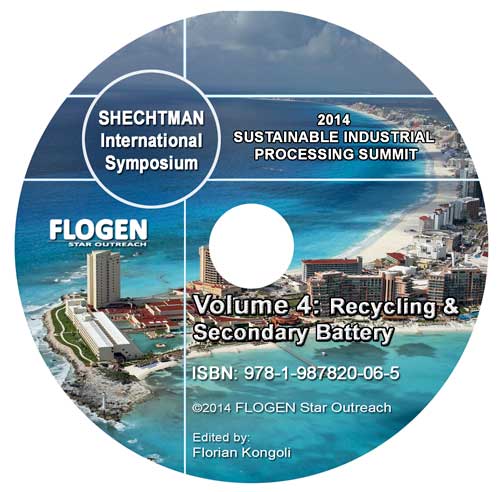2014-Sustainable Industrial Processing Summit
SIPS 2014 Volume 2: Mineral Processing
| Editors: | Kongoli F |
| Publisher: | Flogen Star OUTREACH |
| Publication Year: | 2014 |
| Pages: | 446 pages |
| ISBN: | 978-1-987820-04-1 |
| ISSN: | 2291-1227 (Metals and Materials Processing in a Clean Environment Series) |

CD shopping page
Use of residual frying oil as a collector in phosphate ore flotation
Priscila Oliveira1; Amanda Oliveira1; Jessica Pinto1; Ivo Moacir Simoes1; Denilson Costa1; Andre Carlos Silva2;1UNIVERSIDADE FEDERAL DO SUL E SUDESTE DO PARA, Maraba, Brazil; 2UNIVERSIDADE FEDERAL DE GOIAS, Catalao, Brazil;
Type of Paper: Regular
Id Paper: 69
Topic: 2
Abstract:
Although the mining industry is very important for the economic and social development of any country, it is still seen as highly harmful to the environment. The current economic scenario has been increasingly requiring assurances that extractive activities are developed within the concept of sustainable development, i.e., they meet the basic principles of environmental responsibility and economic viability, without neglecting the demands of the future generations.
In this context, this work is part of the re-evaluation of processes and inputs used in the mineral industry and it aims to verify the possibility of using residual frying oil as an anionic collector in phosphate ore flotation. This study may provide an important strategic contribution to the sustainability in the mining sector, since this oil is a residue generated in large volumes and it is one of the main problems faced by the food industry. The residual frying oil is attractive in the sense that, as it has already been subjected to high temperatures during long periods, it has a great amount of free fatty acids and, as a result, demands lower costs associated with the saponification reaction.
To evaluate the use of this residue as a reagent in phosphate ore flotation, the studied oil will be characterized in fatty acids composition by gas chromatography, and iodine, saponification and acid indices will also be determined. Batch flotation tests will be carried out varying collector dosages in order to verify the reagent efficiency and the obtained results will be correlated with the oil properties.
This paper expects to demonstrate the use of this residue to produce an alternative collector, aiming the partial or total replacement of reagents currently used.